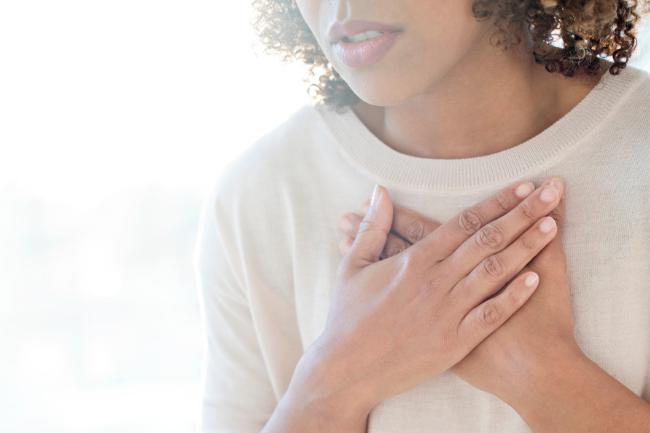Sign Up to Receive the Latest Insights
Subscribe to our blog by filling out the form below!
According to the Anxiety and Depression Association of America, Generalized Anxiety Disorder (GAD) affects 6.8 million adults in the United States. That’s 3.1% of the population, but only 43.2% are receiving treatment. That means millions of people are silently struggling with symptoms that can feel confusing, uncomfortable, and sometimes downright scary.
Today, we’ll break down the common physical symptoms of anxiety, especially the ones that impact your throat and mouth, so you can better understand what’s happening and why. Whether you’re dealing with nausea, dry mouth, or an overactive gag reflex, you’ll learn what to expect and how to start feeling more in control.
Understanding How Anxiety Affects the Body
When you’re stressed, your brain pumps out stress hormones like adrenaline. These chemicals tell your heart to beat faster and your lungs to take in more air, priming your muscles for action. It’s basically your body gearing up to fight or run away from danger – great if you’re actually in danger, but not so fun when the “danger” is just a work presentation or a pile of bills.
Anxiety doesn’t just rev up your heart and breathing – it can also mess with your stomach and throat. When your body is in panic mode, it puts digestion on the back burner (after all, escaping a threat outranks digesting lunch).
This is why you might get a churning or upset stomach, nausea, or even feel like you might throw up. At the same time, you could feel your throat tighten or develop a “lump” in your throat because those stress hormones make even your throat muscles constrict. Intense anxiety can overstimulate a nerve connecting your brain and gut, triggering your gag reflex, so if you’ve ever felt like gagging when you’re anxious, you’re not imagining it.
Common Physical Symptoms of Anxiety

Anxiety can manifest in numerous physical symptoms, some of which might be surprising. Here are some common ones:
Gagging
Some people experience an overactive gag reflex during anxiety, especially when they're stressed, brushing their teeth, or visiting the dentist. This is likely due to overstimulation of the vagus nerve, which connects the brain and the gut.
Anxiety can also make the muscles in your throat constrict, leading to the sensation of a tight throat or a “lump” that makes swallowing feel harder than usual. This is often called globus sensation and is harmless, though it can be unsettling.
Nausea
Your body diverts resources away from digestion when you’re anxious, which can result in symptoms like nausea, bloating, stomach cramps, or “butterflies” in your stomach. For some, it may also cause appetite loss or trigger the urge to use the bathroom more frequently.
Racing Heart
When you’re anxious, your body thinks you’re in danger, even if you’re not. This triggers your fight-or-flight response, causing your heart to pump faster to deliver more oxygen to your muscles. It can feel like your heart is racing, skipping beats, or pounding in your chest.
Sweating
Your body tries to cool itself down during moments of stress, which is why you may sweat more, even if you’re not physically active. Anxiety-related sweating often happens in the palms, underarms, or forehead.
Restlessness
Racing thoughts and physical discomfort can make it hard to fall asleep or stay asleep. Even if you manage to sleep, anxiety can prevent you from getting the deep, restful sleep your body needs.
Even if anxiety makes you feel restless, your body is still using a lot of energy to stay in fight-or-flight mode. Over time, this can leave you feeling exhausted or drained, mentally and physically.
Fast Breathing
Rapid breathing or hyperventilation can cause a drop in carbon dioxide levels in your blood, making you feel dizzy or faint. It’s your body’s way of trying to regain balance when overwhelmed.
Headaches
Tension, muscle stiffness, and hormonal changes brought on by anxiety can all contribute to frequent headaches. If you tend to clench your jaw or grind your teeth when stressed, this can also lead to head pain.
Managing and Alleviating Physical Symptoms of Anxiety

Managing the physical symptoms of anxiety often involves a combination of lifestyle changes, relaxation techniques, and sometimes medication. Here are some strategies:
-
Deep Breathing: Practicing deep, diaphragmatic breathing can help calm your nervous system and reduce symptoms like fast breathing and racing heart.
-
Exercise: Regular physical activity can help reduce stress hormones and increase the production of endorphins, which improve mood.
-
Mindfulness and Meditation: These practices can help you stay grounded and reduce the overall impact of anxiety on your body.
-
Healthy Diet: Eating a balanced diet can support overall well-being and reduce symptoms like nausea and headaches.
-
Therapy: Cognitive-behavioral therapy (CBT) and other forms of counseling can help you manage anxiety and its physical manifestations.
-
Products to Help Ease Stress: There are many products available that can help you alleviate stress. Investing in things like weighted blankets, oil diffusers, or products to help with physical symptoms like NoGag can be extremely beneficial.
When to Seek Professional Help
While occasional anxiety is a normal part of life, chronic anxiety that affects your daily functioning warrants professional help. If you experience persistent physical symptoms that interfere with your ability to work, study, or enjoy life, it's time to consult a healthcare provider.
A mental health professional can offer various treatment options, including therapy and medication, to help you manage your anxiety effectively.
Overcome Anxiety-Induced Gagging with NoGag
While anxiety can show up in frustrating and even overwhelming ways, the good news is that these physical symptoms can be managed. From breathing exercises and therapy to daily routines that reduce stress, many people find relief with the right tools and support.
If your anxiety triggers an overactive gag reflex, especially during everyday tasks like brushing your teeth, taking vitamins, or going to the dentist, NoGag can help. This easy-to-use powder tricks your brain into thinking you’ve eaten, calming your gag reflex so you can get through your routine without discomfort. Ready to take back control?
Learn more about NoGag and how it can help ease your anxiety-related gag reflex.

 Chris Schnee: Jul 02, 2025
Chris Schnee: Jul 02, 2025


